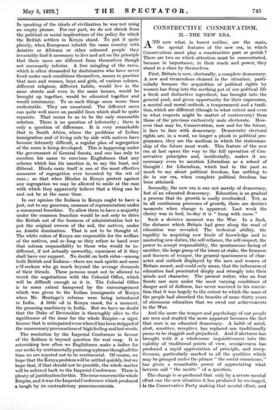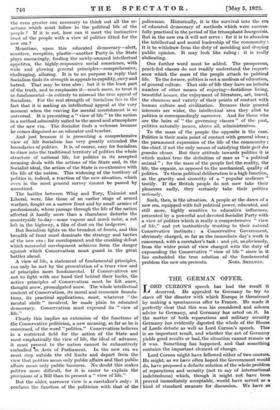A ND now what, in barest outline, are the main, the
special features of the new era, in which Conservatism must play a constructive part or perish ? There are two on which attention must be concentrated, because in importance, in their reach and power, they stand in a class by themselves. • First, Britain is now, electorally, a complete democracy. A new and tremendous element in the situation, parti- cularly because the acquisition of political rights by women has flung into the seething pot of our political life a fresh and distinctive ingredient, has brought into the general pool, and given opportunity for their expression, a mental and moral outlook, "a temperament and 'a tradi- tion, which are different (though to what extent and even in what respects might be matter of controversy) from those of the previous exclusively male electorate. How- ever that may be, Conservatism, now and for the future, is face to face with democracy. Democratic electoral rights are, in a word, no longer a plank in political pro- grammes, they are the medium in which the statesman- ship of the future must work. This feature of the new era at last opens the way to the full operation of Con- servative principles and, incidentally, makes it un- necessary even to mention Liberalism as a school of thought : for Liberalism, which had in the past so much to say about political freedom, has nothing to do in our era, when complete political freedom has been attained.
Secondly, the new era is one not merely of democracy, but of an educated democracy. Education is so gradual a process that its growth is easily overlooked. Yet, as in all continuous processes of growth, there are decisive moments when change is apparent. Last week the cherry was in bud, to-day it is "hung with snow."
Such a decisive moment was the War. In a flash, the distance which Britain had gone along the road of education was revealed. The technical ability, the rapidity in acquiring new kinds of knowledge and in mastering new duties, the self-reliance, the self-respect, the power to accept responsibility, the spontaneous facing of sacrifice, the large grasp of the issues at stake, the firmness and fineness of temper, the general spaciousness of char- acter and outlook displayed by the men and women of Britain meant, and could only mean, that the influences of education had penetrated deeply and strongly into their minds and character. The present writer, who on four fronts saw men under the most varying conditions of danger and of dullness, has never wavered in his convic- tion that it was largely to the extent to which the mass of the people had absorbed the benefits of some thirty years of strenuous education that we owed our achievements in the War.
And the more the temper and psychology of our people are seen and studied the more apparent becomes the fact that ours is an educated democracy. A habit of mind, alert, sensitive, receptive, has replaced one traditionally prone to be sluggish and prejudiced. And if alertness has brought with it a wholesome inquisitiveness into the validity of traditional points of view, sensitiveness has produced a rapid appreciation of principle, and recep- tiveness, particularly marked in all the qualities which may be grouped under the phrase "the social conscience," has given a remarkable power of appreciating what lawyers call "the merits" of a question.
The change is so profound that only by a severe mental effort can the new situation it has produced be envisaged. Is the Conservative Party making that mental effort, and the even greater one necessary to think out all the re- actions which must follow in the political life of the people ? If it is not, how can it meet the instinctive trust of the people with a view of politics fitted for the new era ?
Meantime, upon this educated democracy—alert, sensitive, receptive, plastic—another Party in the State plays unceasingly, feeding the newly-aroused intellectual appetites, the highly-responsive social conscience, with wide and glowing general principles—comprehensive, challenging, alluring. It is to no purpose to reply that Socialism finds its strength in appeals to cupidity, envy and hatred. That may be true also : but it is the least part of the truth, and to emphasize it—much more, to treat it as fundamental—is entirely to misread the true appeal of Socialism. For the real strength of Socialism lies in the fact that it is making an intellectual appeal at the very moment when the craving for mental nourishment is so universal. It is presenting .a "view of life" to the nation in a method admirably suited to the mood and atmosphere of the new era. The Socialist finds a welcome because he comes disguised as an educator and teacher.
And just because it is presenting a comprehensive view of life Socialism has very greatly extended the boundaries of politics. It is, of course, easy for Socialism to draw into the traditional territory of politics the whole structure of national life, for politics in its accepted meaning deals with the actions of the State and, in the Socialist ideal, the action of the State is co-extensive with the life of the nation. This widening of the territory of politics is, indeed, a reaction of the new situation, which even in the most general survey cannot be passed by - unnoticed.
The battles between Whig and Tory, Unionist and Liberal, were, like those of an earlier stage of armed warfare, fought on a narrow front and by small armies of professionals, whose passage through the life of the nation affected it hardly more than a charabanc disturbs the countryside to-day--some vapour and much noise, a rut left in the highway, a film of dust on the hedgerow.
But Socialism fights on the broadest of fronts, and this breadth of front must dominate the strategy and tactics of the new era ; for envelopment and the crushing defeat which successful envelopment achieves form the danger against which Conservatism must guard in the great battles ahead.
A view of life, a statement of fundamental principles, can only be met by the presentation of a truer view and • of principles more fundamental. If Conservatives are not to fight with one hand tied behind their backs, the active principles of Conservatism must be felt anew, thought anew, promulgated anew. The whole intellectual content of Conservatism, its moral and economic founda- tions, its practical applications, must, whatever "the mental strife" involved, be made plain to educated democracy. Conservatism must expound its "view of life."
Clearly this implies an extension of the functions of the Conservative politician, a new meaning, so far as he is concerned, of the word "politics." Conservatism believes in a restricted field for the action of the State and most emphatically the view of life, the ideal of advance, it must present to the nation cannot be exhaustively embodied m Acts of Parliament. In the new era we must step outside the old limits and depart from the view that politics mean only public affairs and that public affairs mean only public business. No doubt this makes politics more difficult, for it is easier to explain the provisions of a Bill than to present a " view of life."
But the older, narrower view is a caretaker's only: it confuses the function of the politician with that of the policeman. Historically, it is the survival into the era of educated democracy of methods which were success- fully practised in the period of the triumphant bourgeoisie. But in the new era it will not serve : for it is to abandon the intellectual and moral leadership of the community : it is to withdraw from the duty of moulding and shaping public opinion. It may look like ruling : it is really abdicating.
One further -word must be added. The prosperous, peach-fed classes do not readily understand the import- ance which the mass. of the people attach to political life. To the former, politics is not a medium of education, of general culture. That side of life they have an infinite number of other means of enjoying—fastidious living, beautiful homes, the enjoyment of literature, art, travel, the closeness and variety of their points of contact with human culture and civilization. Because their general interests are wider, the intellectual area they allot to politics is correspondingly narrower. And for .those who are the heirs of "the governing classes " of the past, politics naturally means, above all, administration.
To the mass of the people the opposite is the case. Polities is their main point of contact with general ideas ; the paramount expression of the life of the community : the chief, if not the only means of satisfying their goat des grandes choses. But. their attitude towards politics it is which makes true the definition of man as "a political animal " ; for the mass of the people feel the reality, the life, the organic, as opposed to the mechanical, quality of politics. To them political deliberation is a high function, as the gravity and sincerity of a "popular audience" testify. If the British people do not now take their pleasures sadly, they certainly take their politics seriously.
Such, then, is the situation. A people at the dawn of a new era, equipped with -full political power, educated, and still more, highly sensitive to educative influences, presented by a powerful and devoted Socialist Party with a view of politics which is really a comprehensive "view of life," and yet instinctively trusting to their natural Conservative instincts : a Conservative Government, obviously charged, so far as the immediate day's work is concerned, with a caretaker's task : and yet, asiobviously, from the wider point of view charged with the duty of expounding the Conservative "view of life" since in it lies embedded the true solution of the fundamental problem the new era presents. NOEL SKELTON.















































 Previous page
Previous page